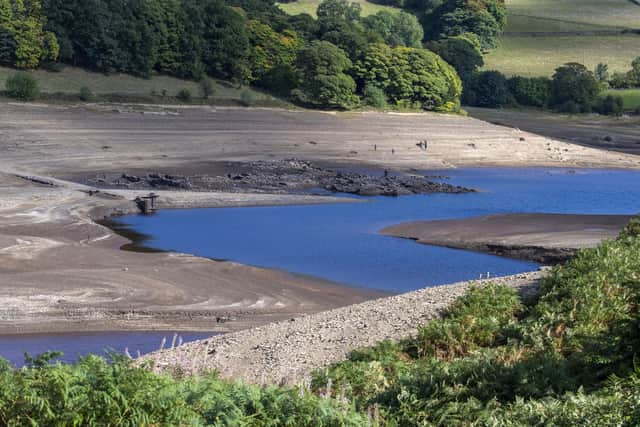Yorkshire Water nearly in breach of licence during drought
The documents have been released following a Freedom of Information request by Greenpeace’s investigative journalism team, Unearthed, and show Yorkshire Water was among a number of water companies the EA was concerned would be unable to provide clean water to their customers.
Yorkshire Water attempted to mitigate the fact that parts of West Yorkshire had experienced their driest spells in 130 years by creating a temporary pipeline to take water from Walshaw Dean reservoir to Ponden reservoir. However, the EA expressed concerns the pipeline - which had been brought in by helicopter - could potentially damage this protected natural area on the South Pennine Moors.
Advertisement
Hide AdAdvertisement
Hide AdA spokesperson said: “As a responsible landowner in the area, we completely understand the sensitivity of the South Pennine Moors and operate within these protected sites regularly so we used helicopters to help us transport and lay a temporary pipeline across the South Pennine Moors from Walshaw Dean reservoir to Ponden reservoir.”


Yorkshire’s first hosepipe ban since 1995 was brought in to try and alleviate pressure on the Worth Valley reservoirs, with those breaking the ban liable to fines of up to £1,000. However, Yorkshire Water received criticism in the wake of the ban as their own estimates showed a loss of 283 million litres of water via leaks in its network each day.
Water levels at reservoirs in Worth Valley had dropped below 28% of their capacity by last September with a further fall of 20% forecast at the time. It saw Yorkshire Water respond by bringing in a temporary pipeline by helicopter to take water from Walshaw Dean reservoir in Calderdale to Ponden reservoir in the Worth Valley.
After a long dry spell across the country last summer, the majority of reservoirs were “exceptionally low” by September, with a number reaching the point of being classed as “dead storage”. This is the point at which the level of water in a reservoir is lower than the spillway or pipeline that supplies the next part of the network.
Advertisement
Hide AdAdvertisement
Hide AdElsewhere, Southern Water - which supplies water to areas along the south east coast of England up to and including the Isle of Man - nearly reached its legal limit of water abstraction from a chalk stream in its catchment area.
Around 85% of the world’s chalk streams, where water rich in nutrients comes from an underground aquifer of chalk, exist in southern and eastern parts of England. Their high nutrient composition makes them valuable habitats for wildlife.
Southern Water came close to its extraction limits in the rivers Test and Itchen - the latter known as one of the world’s best spots for fly fishing.
EA documents show low levels in these chalk streams could pose a threat to Atlantic salmon, although Southern Water withdrew its application for a drought permit after rain in the autumn.
Advertisement
Hide AdAdvertisement
Hide AdTheir spokesperson said: “In 2022 as we saw river levels drop, we applied for a drought permit and did everything we could to reduce demand and protect the rivers including widespread water efficiency advertising and eventually the imposition of a temporary-use ban.
“In the event, levels on the river never dropped below the hands-off flow, no drought permit was needed and we withdrew our application.”
Meanwhile, reservoirs in the South West were also critically low, with one - Upper Tamar - being close to being empty and unusable without a drought permit, according to the EA.
The region is still scarce of water, remaining officially in drought status with a hosepipe ban still in place across all of Cornwall and parts of Devon that will only be lifted on 25 September this year.
Advertisement
Hide AdAdvertisement
Hide AdCampaigners point the finger at what they say is the water industry’s failure to invest in infrastructure, along with the Government failing to hold water companies accountable.
Megan Corton Scott, political campaigner for Greenpeace UK, said: “With leaky infrastructure wasting up to a trillion litres of water a year and no new reservoirs built for decades, climate change could bring severe water shortages to the UK and once again this Government is playing fast and loose with the future of the country.”
South West Water were told by the EA at one point they would have to provide bottled water and tanker trucks if the dry weather continued.
A spokesperson for South West Water said there had been pressure at the Colliford reservoir and nobody had suffered a loss of supply.
Comment Guidelines
National World encourages reader discussion on our stories. User feedback, insights and back-and-forth exchanges add a rich layer of context to reporting. Please review our Community Guidelines before commenting.
